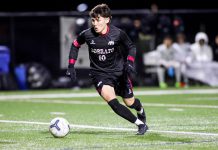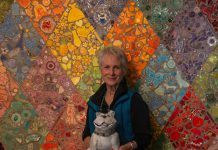More than 200 members of the South Valley community from Gilroy, San Martin, Morgan Hill and south San Jose came together for a peace walk at the Morgan Hill Community and Cultural Center on Saturday, Aug. 19.
The event was planned in response to the recent white nationalist rally in Virginia, where people from several hate groups including the KKK, neo-Nazis and white supremacists clashed with anti-hate protesters in Charlottesville. Events further escalated when a car crashed into demonstrators, killing one and injuring 19 more.
The Clergy Alliance from the Interfaith Community of South County (ICSC) held a meeting on Wednesday, Aug. 16 in the interest of showing how the world could be different than the events that occurred in Charlottesville.
Word of the Peace Walk and Vigil quickly spread through the members of the ICSC, the larger faith community, social media and others interested in promoting peace.
Each of the clergy arrived at the Morgan Hill venue in traditional garments—robes, stoles, prayer shawls and head coverings—all respective of their faith traditions.
From Christian vestments and the saffron robes of Buddhist monks to the common head coverings of the Muslim kufi and the Jewish kippah—all faiths in the area were represented and unified in their message of peace.
“I think it’s important to make our case for how we want to express our free speech—which is, we’re against hate, we’re against exclusion and we’re for peaceful engagement and acceptance,” said Phil Cooke, priest at St. John the Divine Episcopal Church in Morgan Hill.
Father Jose Rubio of St. Mary Catholic Church in Gilroy felt with the vocal demonstrations around the country that it was necessary that people in South County be united in their stance against hate.
“I am very surprised at this anti-semitic feeling, anti-immigrant feeling, anti-Muslim feeling,” said Rubio. “I think it’s important—as little as South County is—for (local) people to say something.”
In his participation, Imam Ilyas Anwar of the South Valley Islamic Community in San Martin wanted to make clear that there are many people who don’t want to tolerate actions and language that perpetuates hate.
“There’s no place for hate in our country,” said Anwar. “Not in our community, not in our country.”
Anwar noted that it was critical for all people to speak out and speak up. “We have to be part of this community,” he said “You can’t live in isolation—regardless of race, color, gender—whatever it may be—that’s all secondary. The first thing is: This is our home and we have to make it. We have to make sure that the peace and safety stays here.”
Love is the answer
In addition to clergy, the event was attended by nearly a couple hundred laypersons, including several active city council members as well as the mayor of Morgan Hill, Steve Tate.
Morgan Hill councilmember Rene Spring, wearing a black shirt with several lines declaring “love is love” written in a rainbow of colors, said that he was there to show his solidarity.
“There is so much hatred,” Spring said. “I’m not a believer in hate. I don’t care if you’re left or right. I think we just need to love each other more, respect each other more and I wanted to show that.”
Fellow Councilmember Caitlin Jachimowicz said she participated in the peace walk because she wanted to show there are more people who are full of love, and those that hate are fewer and farther between.
“But, I think they are louder—and so I think it’s important for us to band together and work on amplifying our voices in support for one another, in unity and in love,” Jachimowicz said.
The walk, less than a mile down around Monterey Road and back, ending at the United Methodist Church, concluded with messages from many of the clergy.
In her talk, Rabbi Debbie Israel of Congregation Emeth in Morgan Hill said she was asked to give a speech and not a prayer specifically. “In my tradition, a call to action is a prayer, speaking truth to power is a prayer.”
Israel went on to draw a comparison to several times in history where the Jews of Europe cowered in their homes fearful of Nazis marching through the streets or similarly, in the early days of the Ku Klux Klan, when African Americans hid behind closed doors when klansmen put on their robes. Israel noted their silence didn’t halt atrocities.
“But in 2017, we will not cower behind closed doors and we will not cower,” spoke Israel. “We will not be treated as ‘other.’ We do not accept that our black brothers and sisters and our Jewish brothers and sisters need to stay home because neo-Nazis are coming to town. We all stand together, stand proud together.”







